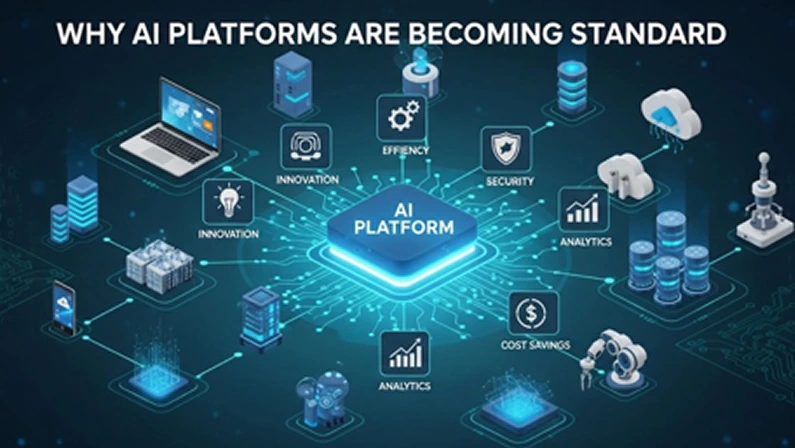
More than a trend, AI platforms are now a core part of business strategy. They're helping companies automate, get better data insights, and deliver exceptional customer experiences.
AI platforms are becoming a standard because they offer a clear competitive advantage by optimizing operations and providing deep, actionable insights. With the shift toward data-driven decisions, these platforms provide the speed and accuracy businesses need to succeed.
The Shift Toward AI-Driven Business Models

Businesses are moving away from legacy systems to more adaptive, intelligent platforms. This shift is driven by the need for better efficiency, personalization, and a new way of operating. It’s no longer a question of if, but when a business adopts an AI-first approach. This digital transformation solutions strategy isn't about replacing people, but empowering them with powerful AI-powered business tools.
From Traditional Software to AI-First Platforms
Gone are the days of rigid, one-size-fits-all software. We're now in an era where software adapts and learns, creating a more dynamic operational model. This evolution from static programs to self-improving systems is reshaping how we work and how businesses interact with their customers. The adoption of an AI-first approach is fundamentally changing business operations.
- Traditional software is rules-based and requires manual updates.
- AI-first platforms use data to learn and improve autonomously.
- This shift enables dynamic, responsive operations.
Market Trends Driving AI Adoption
The market is rewarding businesses that are quick to innovate and adapt. Several powerful trends are making AI platforms an indispensable part of modern business infrastructure. From the explosion of data to the demand for hyper-personalized services, these forces are pushing companies to embrace AI more quickly than ever before. This is the future of AI in business.
- Increased data volume creates a need for automated analysis.
- The demand for personalization is at an all-time high.
- Competitive pressures force businesses to find new efficiencies.
Key Benefits of AI Platforms That Set the Standard
The value of AI platforms comes from the tangible benefits they deliver, from operational improvements to a better bottom line. These platforms are not just a nice-to-have; they're foundational for any company looking to stay ahead. They're a key driver of AI business transformation across industries.
Real-Time Data Insights and Predictive Analytics
AI platforms can process massive amounts of data in real time, turning raw information into actionable insights. This capability goes far beyond simple reporting; it uses predictive analytics software to forecast future outcomes.
Companies can anticipate market shifts, consumer needs, and potential operational bottlenecks before they happen.
This kind of foresight is a game-changer for strategy and decision-making. Imagine a retail company that can predict which products will sell best in a given region next quarter, or a hospital that can anticipate which patients are at risk for readmission.
Automation of Routine Tasks
Intelligent automation is at the core of AI platforms, freeing up employees from monotonous, repetitive tasks. This isn't about eliminating jobs, but about reallocating human capital to more strategic and creative work. For example, AI can handle everything from processing invoices to scheduling meetings, allowing staff to focus on solving complex problems. This leads to higher productivity, better employee satisfaction, and fewer errors.
- AI handles data entry and document processing with high accuracy.
- Customer service chatbots can resolve common queries instantly.
- Automated reporting reduces the time spent on manual data compilation.
Scalability and Flexibility
Cloud-native AI platforms are inherently scalable, meaning they can grow and adapt with a business's needs. You don't need to invest in expensive hardware or infrastructure upfront; you can simply scale your use of the platform up or down as demand changes.
This flexibility is particularly valuable for startups and small-to-medium businesses (SMBs) that need to be agile and manage costs. This type of platform is a vital digital transformation solutions component.
Enhanced Customer Experience
Customers today expect personalized interactions. AI platforms enable customer personalization with AI, providing tailored product recommendations, relevant content, and proactive support.
By analyzing customer data, these platforms can create a unique journey for each individual. A streaming service might use this to recommend movies based on viewing history, while an e-commerce site can display products that a customer is most likely to buy. This level of personalization builds loyalty and drives repeat business.
Why Businesses Can’t Afford to Ignore AI Platforms
Ignoring AI platforms is akin to ignoring the internet in the 90s. The long-term consequences can be catastrophic for a business's viability and growth.
Companies that fail to adopt this technology risk falling behind their competitors, losing market share, and becoming irrelevant. This is a critical moment for AI business transformation.
Competitive Advantage
The companies that are adopting AI platforms are gaining a significant edge. They're able to launch new products faster, optimize their supply chains, and respond to market changes with remarkable speed.
This is about superior strategic capability. For example, an insurance company using predictive analytics software to model risk can offer more competitive rates than one relying on traditional methods.
Cost Savings and ROI
The return on investment from AI platforms is often substantial. By automating tasks and optimizing processes, businesses can reduce operational costs and improve profitability.
AI can also help identify new revenue streams by revealing hidden patterns in data and pinpointing market opportunities that would otherwise be missed. This makes a strong case for integrating AI-powered business tools.
Integration with Existing Systems
Modern AI platforms are designed to integrate seamlessly with existing software and infrastructure. This means you don't have to rip out everything you have to get started.
These platforms can be layered on top of your current systems to add new capabilities, like adding an intelligent automation layer to an old CRM. This makes adoption far less daunting and minimizes disruption.
Industries Leading the Adoption of AI Platforms

While AI is impacting every sector, some industries are moving faster than others. These leaders are demonstrating the immense potential of AI platforms to solve specific, complex problems and create new value. The future of AI in business is being defined by these early adopters.
Retail and E-Commerce
The retail sector has been a pioneer in using AI platforms. From dynamic pricing and inventory management to personalized shopping experiences, AI is everywhere. This is where customer personalization with AI is most visible. Retailers use AI to predict demand for products, optimize warehouse logistics, and even manage customer returns.
Healthcare
In healthcare, AI platforms are being used for everything from accelerating drug discovery to improving patient diagnostics.
AI can analyze medical images with incredible speed and accuracy, and intelligent automation can streamline administrative tasks, allowing medical staff to focus on patient care. The use of cloud-native AI platforms is also helping to secure and manage sensitive patient data.
Manufacturing
Manufacturing is leveraging AI platforms to optimize production lines, perform predictive maintenance on machinery, and improve quality control. AI can monitor equipment in real time, alerting technicians to potential failures before they happen, which saves a huge amount on repair costs and minimizes downtime. This level of operational optimization is a direct result of embracing AI business transformation.
SMBs and Startups
SMBs and startups are also embracing AI platforms because they're now accessible and affordable.
The availability of cloud-native AI platforms and flexible pricing models means that small businesses can now compete with larger corporations on data and automation. This is helping them scale quickly and innovate without the massive capital expenditure that was once required. The future of AI in business is about democratization.
The Future of AI Platforms as the Business Standard
The trend toward AI platforms becoming the business standard isn't slowing down; it's accelerating. As the technology becomes more sophisticated and easier to implement, we'll see a future where every business, no matter its size, relies on AI for core functions.
This new era will be defined by an even deeper integration of AI into our daily workflows, making operations smarter, faster, and more intuitive.
The Standard Has Arrived: Embracing AI for Growth

The shift to AI platforms is a strategic imperative. Businesses that adopt a platform like Leapify CRM are not just automating tasks; they're gaining a competitive edge.
Leapify CRM, a powerful predictive AI CRM, allows businesses to anticipate customer needs and streamline operations with a level of insight previously impossible. It's the kind of AI-powered business tools that will define future market leaders.
Start your AI business transformation today. Embrace the power of predictive analytics software and customer personalization with AI with Leapify CRM. Contact us to get started with Leapify CRM.



